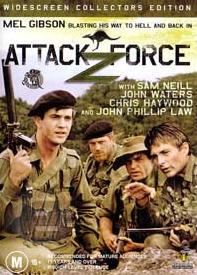Timothy Burstall AM was an English Australian film director, writer and producer, best known for hit Australian movie Alvin Purple (1973) and its sequel Alvin Rides Again (1974).

Attack Force Z is a 1982 Australian-Taiwanese World War II film directed by Tim Burstall. It is loosely based on actual events and was filmed in Taiwan in 1979. It was screened at the Cannes Film Festival on 18 May 1981.

Alvin Purple is a 1973 Australian sex comedy film starring Graeme Blundell in the title role; the screenplay was written by Alan Hopgood and directed by Tim Burstall, through his production company Hexagon Productions and Village Roadshow.
Peter Hehir is an Australian retired actor. He had a regular role as Bert Duggan on the soap opera The Sullivans from 1976 to 1978. His film appearances included The Last of the Knucklemen (1979), I Live with Me Dad (1985), The Hour Before My Brother Dies (1986), Two Friends (1986) and Fast Talking (1984), the latter of which he was nominated for the 1984 Australian Film Institute Award for Best Actor in a Supporting Role.
Alvin Rides Again is a 1974 Australian sex-comedy film sequel to Alvin Purple. It was directed by David Bilcock and Robin Copping, who were regular collaborators with Tim Burstall. It was rated M unlike its predecessor which was rated R. Alvin Rides Again still features a lot of full frontal nudity.
Roadshow Entertainment is an Australian home video, production and distribution company that is a division of Village Roadshow that distributes films in Australia and New Zealand. Their first release was Mad Max. Roadshow Entertainment is an independent video distributor in Australia and New Zealand.
Kangaroo is a 1987 Australian drama film directed by Tim Burstall and starring Colin Friels, Judy Davis, and John Walton. It is based on the 1923 novel of the same name by D. H. Lawrence.
Libido is a 1973 Australian drama film comprising 4 segments written and directed as independent stories, but screened together as one piece, exploring a common theme of instinctive desire and contemporary sexuality.
Petersen is a 1974 Australian drama film directed by Tim Burstall.
Stork is a 1971 Australian comedy film directed by Tim Burstall. Stork is based on the play The Coming of Stork by David Williamson. Bruce Spence and Jacki Weaver make their feature film debuts in Stork, being honoured at the 1972 Australian Film Institute Awards, where they shared the acting prize. Stork won the prize for best narrative feature and Tim Burstall won for best direction. Stork was one of the first ocker comedies. Stork was the first commercial success of the Australian cinema revival called the Australian New Wave.
2000 Weeks is a 1969 Australian drama film directed by Tim Burstall and starring Mark McManus, Jeanie Drynan, and Eileen Chapman.
Eliza Fraser is a 1976 Australian bawdy adventure drama film, directed by Tim Burstall and starring Susannah York, Trevor Howard, Noel Ferrier and John Castle. The screenplay was written by David Williamson.
The 22nd Australian Film Institute Awards ceremony, presented by the Australian Film Institute (AFI), honoured the best Australian feature films of 1980, and took place on 17 September 1980 at Regent Theatre, in Sydney, New South Wales. The ceremony was hosted by Graham Kennedy and televised in Australia on ABC.
End Play is a 1975 Australian thriller film directed by Tim Burstall and starring George Mallaby, John Waters and Ken Goodlet. It was an adaptation of the 1972 novel End Play by Russell Braddon. It was made by Hexagon Productions.
Hexagon Productions was an Australian film production company established in 1972 by Roadshow Distributors with Tim Burstall and Associates and the company Bilcock and Copping. All parties had successfully collaborated on Stork (1971) and wanted to engage in further production. The company was owned along the following lines:
The Naked Country is a 1985 Australian film. It was based on the 1957 novel by Morris West.
Fast Talking is a 1984 Australian film written and directed by Ken Cameron. It starred Rod Zuanic and Steve Bisley and Tracy Mann
The Last Outlaw is a 1980 Australian four-part television miniseries based on the life of Ned Kelly. It was shot from February to May 1980 and the end of its original broadcast, in October–November 1980, coincided with the centenary of Ned Kelly's death.
Michael Duffield was an English-born character actor who worked in Australia for many decades. He was nominated for the 1979 AACTA Award for Best Actor in a Supporting Role for his role in The Last of the Knucklemen, a role he was reprising from the original stage production.

